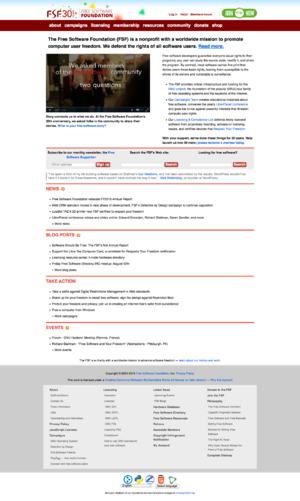Free Software Foundation
Contents
Self-portrait
The Free Software Foundation (FSF) is a nonprofit with a worldwide mission to promote computer user freedom. We defend the rights of all software users.
As our society grows more dependent on computers, the software we run is of critical importance to securing the future of a free society. Free software is about having control over the technology we use in our homes, schools and businesses, where computers work for our individual and communal benefit, not for proprietary software companies or governments who might seek to restrict and monitor us. The Free Software Foundation exclusively uses free software to perform its work.
The Free Software Foundation is working to secure freedom for computer users by promoting the development and use of free (as in freedom) software and documentation—particularly the GNU operating system—and by campaigning against threats to computer user freedom like Digital Restrictions Management (DRM) and software patents.
Description
The FSF (Free Software Foundation) is a nonprofit organization promoting the use of free software, which is developed to allow users freedom to use, copy, distribute, modify and execute it, instead of yielding power to private companies whose end goal is profit, or to governments restricting and invading their citizen’s privacy.
Activist and programmer Richard M. Stallman started the free software movement in 1983 by announcing the creation of GNU, a Unix type operating system with a free software license, made up of a collection of applications, libraries, development tools and games. Each year, the GNU General Public License (GNU GPL) is published, the most popular of its kind, written for the purpose of preserving its freedom.
Stallman started the Free Software Foundation in 1985, which has carried out campaigns to raise awareness of the free software movement, pushing for a social transition starting with programming ethics, to the conscientious use of technology as a right of every member of society.
The FSF leads several campaigns, such as: the Free Java Script Campaign, Secure Boot vs Restricted Boot, Upgrade From Windows, Surveillance Campaign Area, Working Together For Free Software, Defective By Design (against restriction and invasion of privacy), and PlayOgg (for the freedom to use audio and video formats, such as MP3, Quick Time or Windows Media, without restrictions).
Resources, education and support regarding free licenses for software developers are found under the Licensing section of the Society’s website. There is also a guide on choosing the right license for the job at hand, aided with a section of frequently asked questions.
The website compiles a series of informative resources, such as a directory of over 15,000 free software packages, free GNU/Linux distributions, a service directory, webmail systems, PDF readers, mailing lists promoting the movement, text, audio, video, and even job advertisements in free software.
LibrePlanet is a place for the community involved and interested in the free software movement. It works as a platform to support and empower academic, project and work groups through common topics of discussion.
Manifesto
Richard Stallman (1985) GNU Manifesto.
Links
URL: https://fsf.org/
Wayback Machine: https://web.archive.org/web/20160204233302/https://fsf.org/
Wikipedia: https://es.wikipedia.org/wiki/Free_Software_Foundation
